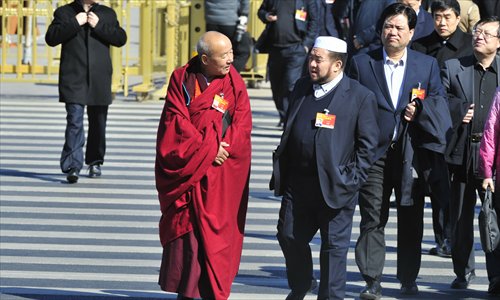
Several political advisers on ethnic and religious affairs gather in front of the Great Hall of the People in Beijing on Wednesday. Photo: CFP
China's National Religious Affairs Administration released regulations on religious clergy on Tuesday, stressing the importance for religious personnel not to be influenced by overseas forces or get involved with activities that jeopardize ethnic unity or national security.
The new regulations, titled "Measures for the Administration of Religious Personnel," will be put into force on May 1 to better identify the responsibilities of religious clergies, improve the cultivation of religious talents and protect their legal interests in accordance with laws, according to a release from the website of the administration.
It lists 52 articles in seven chapters, covering the interests enjoyed by religious clergy and their responsibilities, the qualification reorganizations and the administration of them. It also states that religious clergy should resist illegal religious activities, religious extremism or overseas forces' use of religion to infiltrate China.
Religious personnel should not do the following: undermine national security and public safety; promote, support or fund religious extremism; split the country; engage in terrorist activities; be manipulated by overseas forces or accept designation from overseas religious groups or institutes, or violate principles on independence from outside, according to the release.
The regulations also stipulate that the succession of a living Buddha should be carried out under China's relevant regulations. Catholic bishops in China should be approved and ordained by the Bishops Conference of the Catholic Church in China.
"The main purpose (of the regulations) is to strengthen the guidance of religion to maintain social security and stability," Cao Wei, an expert on history and security studies at Lanzhou University, told the Global Times on Tuesday.
Cao noted that there have been some cases of illegal religious gatherings in China. Most of the organizers of these groups were illegal religious clergy, who have been influenced by extremist religious ideologies, and set up so-called religious study classes for profit.
"The contents they taught and propagated were not genuine religious doctrines, but ideologies that endangered social stability," he added.
Cao pointed out that the ideological roots behind the successive violent terrorist incidents in Xinjiang Uygur Autonomous Region over the years were to a large extent the large-scale infiltration of extremist ideologies from abroad.
"Religious clergy are like a pacemaker who plays a very important role in guiding believers. Specifying regulations on religious personnel can largely prevent those who do not have religious qualifications or have ulterior motives to undermine the social stability and political security of the country," Cao said.




